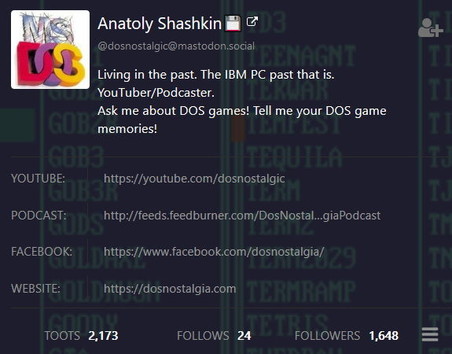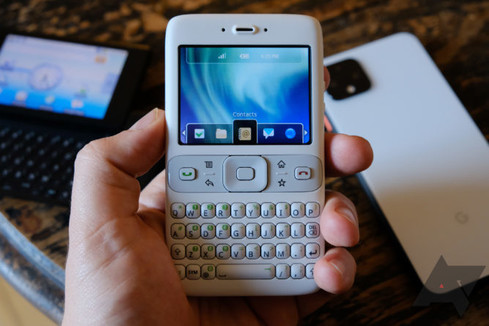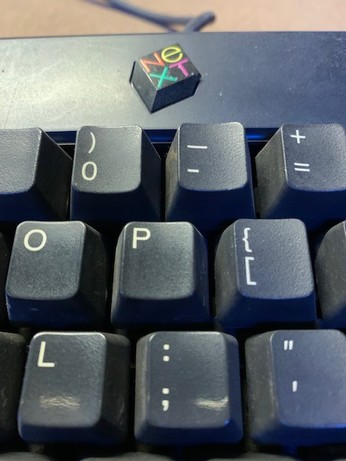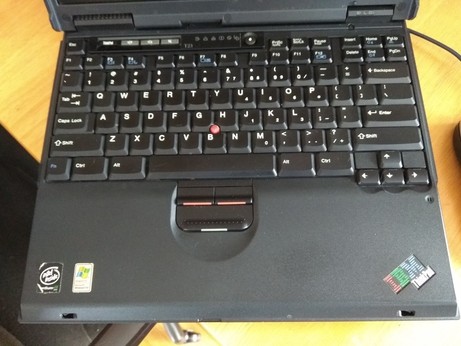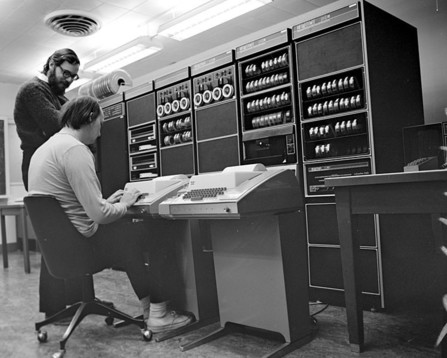
And I just discovered that Anatoly is here in the Fediverse too -- I follow him on Twitter, and enjoy the many #Retro #Tech posts, games, screenshots, pixel art.
---> @dosnostalgic
#FF Recommended ! #Computing #RetroGaming
The Very FIRST #Android phone -- was developed before Apple's 2007 iPhone appeared. Consumer reaction to that made Google ABANDON this design, start from scratch, touch screen keyboard. Like #Apple. #IT #History #Vintage #Computing #Retro #xp
---
RT @AndroidPolice
The first Android phone wasn't the HTC G1—it was this weird Google prototype, and I used one https://www.androidpolice.com/2020/05/24/android-was-born-on-this-weird-old-pro…
https://twitter.com/AndroidPolice/status/1264615153363902464
@k11m1 Yeah, it was something that was needed when computing power was a precious resource, much less common, and we needed to conserve it.
Good things resulted from that - people created solutions to enable remote access, shared systems, one large machine that processed tasks from many people or departments; scheduling, so you could slot a job for some late hour when there were less people around.
Following the logic is a good thing, as you write line by line, it should make sense, and flow -- or else, why did you use that line, and the next?
There are pesky typos that break things, but other than those small input errors, the code should be understandable and make sense.
Someone else might have to work on it someday, and that will make their job easier and faster too.
Back in time programming languages were developed to cater to some specific need or group of users; making it easier to create the projects they needed.
We used Fortran, which is Formula Translation; it was created for Science and Engineering students and professionals.
I had a room mate who was in the Math department, we were both 1st year students, had the same Profs (from Math department), and the same assignments.
But his class used another language, called Algol - which was a better fit for Math people's needs.
We enjoyed comparing the finished results of our assignments; quite simply, we looked at the thickness of each other's stack of cards. Sometimes, Algol would win (win being a smaller deck, less processing time), other times Fortran got it.
It was my first time ever seeing and working with a computer -- a mammoth Burroughs 5500 mainframe, and I loved every aspect of it.
Over time, I observed that I could tell right away when something was broken in a new project.
* When I had my source code written up, the next step was to hand it in, for a pool of secretaries who would prepare our cards, overnight. Or find a spare IBM punch machine somewhere (my preferred, faster route).
* Got the cards? Processing time! Go to the computing center, and get in line with other students with their own decks; we lined up outside, in front of a room that contained a card reader (input) and a large printer (output). This was a smaller room, wired to the computer next door which was all air conditioned to around 18 degrees C year around.
* The card reader had two doors, it's own Input and Output of student processing; in via one, hand in the deck, watch it be read, get a printout, out via the other door.
* As the deck was handed in and loaded into the card reader, we stood watching, hoping for a good run. Any result would produce a paper printout, those continuous paper forms. Many times, it was a report of an error at some point.
* processing took some seconds; and I noticed that sucess or failure was indicated by the card reader behaviour; a perfect program would pass thru the reader in linear fashio, smooth flow. I got excited, maybe this time it's all Good!!
* I also noticed that hesitations in the stack flow indicated errors; it would stop at some card, pause or a few seconds, Bad sign! Soon it would resume, a short report printed, and a more or less dejected student headed out door #2.
...to go back to his desk, his notes and code write up. Read the report (quite cryptic usually), and trace thru the programme to find what was wrong.
Getting a smooth card reader flow was an instant sign I might have made it - and at best happened at the 3rd try or so (worse sometimes, in harder jobs or if you weren't focused enough).
Some great work was done in developing whole languages to be used for teaching Programming, like Pascal -- good habits would carry on into a professional's work life, and be appreciated by anyone working with this person, or later maintaining their legacy code.
Have you ever seen or heard of the Altair 8800?
Tech historians and #retro #computing people know. Important, fist personal computer ever.
Original at his post : https://mastodon.sdf.org/@jebug29/103439876154972389
Jess is rebuilding one, and I just found a pic, cropped here for size (Bytes, I save them).
It's fun to find pictures like this, and pages on the web showing I am not the only lover of arcane, vintage #retro Technology.
Next computer, no text yet but photos on Jason's blog page.
Story Time : How I got started in Computer Networking
RT from https://hackers.town/@rgx/103317533135685592
My first one was an US Robotics Courier 2400 bps, internal model.
I had to learn VERY quickly of all the intricacies of IRQs, Com port addresses and default assigned IRQs, Jumper settings to change those.
And -- even when perfectly configured for a Com 2, IRQ 3 (I think it was, been a long time), it did not work well at all.
More troubleshooting, and it was the beginning of my learning of many aspects of PC technology. Fast forward 5 years and I was teaching a Computer Repairs class, all from what I learned on my own, struggling but persevering and getting things working in the end.
Loved it, specially when things were working well!
Turns out, the modem problem wasn't the modem, or any ports on the ISA expansion card this system had. It was the mouse, a Logitech bus mouse with its own ISA controller card, which had been set by jumpers to use IRQ 3, the one I wanted, default for Com2 serial ports.
Once I figured that, a Jumper change and it moved to IRQ 5; no more conflicts.
And my adventures in the BBS world started. Becoming an active member of FidoNet was the next phase.
Internet? that took about 4 years before I could get access, when joining a University. NO consumer internet existed at the time, it only became more common later, 1996-7 or so.
#modem #DialUp #networking #IRQ #ISA #Retro #Computing #hobby #PCtech
Blog Post coming soon...
Find FREE older window apps, full op system releases. Mac, OS/2,
And then we discover new and cool places... When looking for cool and old software.
Adobe PageMill in my case. Now abandoned, FREE, used to be their web dev solution around 1999.
"WinWorld is an online museum dedicated to the preservation and sharing of vintage, abandoned, and pre-release software. We offer information, media and downloads for a wide variety of computers and operating systems.
Our entire library is free, open and available to everyone. "
#retro #computing is alive and well.
* apps library : https://winworldpc.com/library/applications
* op systems library : https://winworldpc.com/library/operating-systems
Another system photo. IBM ThinkPad, model T23, a powerful model at its time, I used it for ten years at work.
Still runs well, used it for some Cad work the other day, the version of AutoCAD I have won't run on newer opsys.
Maxed out with 1 GB of ram, 1.1 GHz PIII processor, single core. XP for Legacy systems os.
Photo by Xiao MI Red MI Note 5 Prime. Sys specs greatly outweigh the ThinkPad.
8 cores processor, 3 GB RAM, Arm 64 processor. Android 7.1.2,. MIUI 11.
"Ken Thompson (sitting) and Dennis Ritchie working together at a PDP-11"
A Mini computer, made by DEC, Digital Equipment Corporation, one of the great names in American computing history that disappeared into mergers and acquisitions (bought by Compaq, I think)
- Blog W.Freely :
- https://write.tedomum.net/rgx/
- Glitch-Social :
- https://muensterland.social/@rgx
- Pleroma :
- https://fedi.absturztau.be/yann
- Cats ! :
- https://catgram.jp/@yann2
Books, Bicycles & Cats, Life is Good. Books, hardcover. Bikes, Classic sport and Touring ones. Cats, any colour or size. Aquarius with Virgo rising. INTJ.
STEM Lord, House of Ravenclaw.
I have moved -- please visit my other accounts.
* Follow my Main & Publishing account : https://muensterland.social/@rgx
* Cats photos, now posted at Catgram.Jp : https://catgram.jp/@yann2
* Pleroma Home is at FAB : https://fedi.absturztau.be/yann
Spoken & Written Languages : English. Español. Português.
